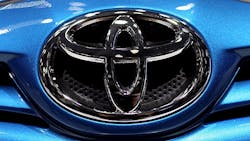In the latest foray by a major manufacturer into the world of automated vehicles, Toyota Motor Co. (IW 1000/8) on Oct. 6 unveiled a car that can drive itself along a highway.
The car, a modified Lexus GS, uses sophisticated sensors to navigate roads, merge lanes and overtake other vehicles.
The company hopes to make other cars with similar features available within five years, in time for Tokyo's hosting of the Olympics.
"We aim to be operational by 2020, the year when Tokyo welcomes the Olympic Games," Yoshida Moritaka, Toyota's chief safety technology officer, told reporters at the car's unveiling.
In its current incarnation, the car only switches to fully automated mode once it reaches the less frenetic confines of a highway and passes a sensor.
"The car we have here is able to drive independently from the highway entrance to the exit," Moritaka said.
But Toyota hopes the technology will help it one day build an entirely driverless car as well as reduce accidents and congestion.
Toyota has been a relative latecomer to the rush to design automated cars. But last month it announced plans to invest $50 million in building artificial intelligence into its vehicles. The joint research with Stanford University and the Massachusetts Institute of Technology will take place over the next five years, Toyota Motor Corp. said.
Several major carmakers and technology giants have been pursuing autonomous vehicle technology.
Google has been testing self-driving cars in Silicon Valley, while Nissan (IW 1000/33) has vowed to put an automated car on Japan's highways as soon as 2016.
In 2018, Nissan models should have the ability to avoid hazards and to change lanes, and by 2020 vehicles should be able to autonomously maneuver through crowded city roads.
Apple is also rumored to be pursuing the technology.
Copyright Agence France-Presse, 2015
About the Author
Agence France-Presse
Copyright Agence France-Presse, 2002-2025. AFP text, photos, graphics and logos shall not be reproduced, published, broadcast, rewritten for broadcast or publication or redistributed directly or indirectly in any medium. AFP shall not be held liable for any delays, inaccuracies, errors or omissions in any AFP content, or for any actions taken in consequence.
